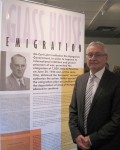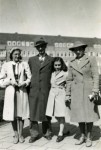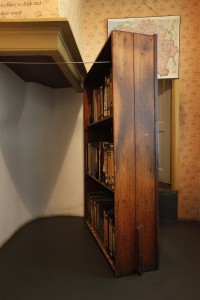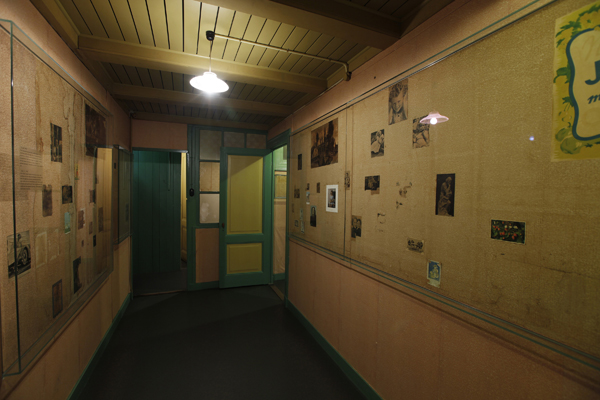Swiss Consul General Urs Strausak at the opening reception of the Carl Lutz and the Legendary Glass House exhibit, which features panel displays as well as various artifacts. (photo by Cynthia Ramsay)
He was the first Swiss national to be awarded the Righteous Among the Nations by Yad Vashem and he is credited with using his diplomatic privileges to save tens of thousands of Jewish lives during the Holocaust. However, an exhibit dedicated to him had eluded Vancouver – until now.
Last week, Carl Lutz and the Legendary Glass House in Budapest opened at the Vancouver Holocaust Education Centre (VHEC). A partnership between VHEC, the Swiss consulate in Vancouver and local Jewish families, the opening reception on Oct. 23 drew a full house, with a wide range of ages represented, from Holocaust survivors to young children, who attended with their parents. Several volunteer docents were on hand to walk the public through the displays and take questions.
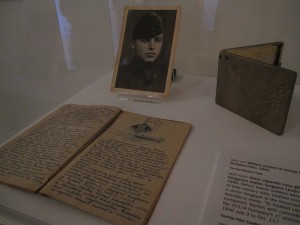
Panels display various topics, including Jewish life in Hungary before the Second World War, the rise of Nazism and the Glass House, where thousands of Jews found refuge, as well as personal stories from the era. The exhibit, sent by the Carl Lutz Foundation in Budapest, is enriched by a companion exhibit that includes testimony and artifacts from local Hungarian Holocaust survivors, showcasing important themes relevant to Lutz’s environment and life.
Nina Krieger, VHEC executive director, said the exhibit demonstrates the complexity of moral decision making in a turbulent time.
“Alongside narratives of moral courage and rescue, we must recognize, of course, that these were the rare exceptions,” she said.
She went on to discuss the artifacts, which bring a direct connection between the era and a visiting audience.
“On display are materials that reflect a vibrant prewar Jewish life in Hungary – a cherished prayer brook and photographs of everyday life – as well as evidence of antisemitism and persecution,” she said.
“An 18th-century silver chanukiyah buried by Dr. Joseph and Anna Lövi in the basement of a neighbor’s home on the eve of their deportation to Auschwitz survived; its owners did not. The chanukiyah was retrieved in July 1945 and given to one of their daughters, Judith Lövi Maté. Judith and her infant son Gabor had found refuge in the Glass House, representing a local family intimately connected to Carl Lutz.”
Swiss Consul General Urs Strausak, whose participation helped make the exhibit possible, emphasized the need for education about the Holocaust in his country and around the world.
“The study of the Holocaust shows the danger of being silent in face of evil, and education is a tool to make sure atrocity will never happen again,” he said in his speech at the exhibit opening. He explained the place of Holocaust education in Swiss education, saying, “The topic of [the] Holocaust is taught within the context of history teaching and civic education. Some aspects of the Holocaust are also addressed in social science, religious studies and literature.” Switzerland joined the International Holocaust Remembrance Alliance, an intergovernmental organization dedicated to promoting Holocaust education and research, in 2004.
Asked about his connection to the exhibit, Strausak, who is a personal friend of Lutz’s daughter and current curator of the Carl Lutz Foundation, said it was an important event to reach out to the Jewish community and beyond and help support further communal education. Teaching has to start early, he said, and it is important to emphasize figures such as Lutz since he was more than simply a person who saved Jews. “He was a mensch and people need to have the courage to speak out [regarding evil],” he said.
Carl Lutz and the Legendary Glass House in Budapest will be at VHEC until Feb. 15, and is open to the public by donation. More information on the exhibit and becoming involved with VHEC can be found at vhec.org.
Gil Lavie is a freelance correspondent, with articles published in the Jerusalem Post, Shalom Toronto and Tazpit News Agency. He has a master’s of global affairs from the Munk School of Global Affairs at the University of Toronto.

